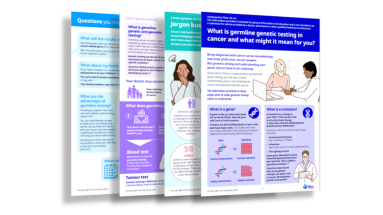Genes, genetics, and inherited cancers
The science of genes and how they can sometimes be linked to cancer can sound complicated. Let’s try and break it down a little…
Genes are coded messages that carry information about how our bodies grow and behave. They are found within our cells: the building blocks of our bodies.1,2
Sometimes changes can occur in the coded message of a gene. These are known as mutations. They can damage the cell and affect how it works.1,2 Changes in certain genes can increase the risk of getting certain diseases or cancers.1,2
Most changes happen throughout your life.3 However, some can be passed down from your parents and you will have them from birth. These are called inherited mutations.1
If you inherit a gene mutation, it does not mean you have cancer, but you may have a higher chance of getting certain types of cancer. 1,2,4 Understandably this is a scary thought. Keep reading to learn more about how you can find out if this might affect you and the support available to you.
What types of cancers can be inherited?
Most cancers develop due to a mixture of reasons: 1-3
- Chance, unknown reasons you can’t do anything about
- Things you are exposed to, for example too much sunlight and cigarette smoke
- Your lifestyle, for example being inactive and having an unhealthy diet
- High levels of stress or loneliness that lasts a long time5
Some cancers can be caused by inherited gene mutations. This means an inherited mutation in one of your genes that you have from birth, passed to you by your parents.1,6
Changes to different genes increase the risk of getting different types of cancer.
For example the BRCA1 and BRCA2 genes help your cells grow and divide in the right way. A change in one of these genes is linked to a higher chance of getting either breast, ovarian, prostate or pancreatic cancer.4,7,8
Another example is the APC gene which helps control how your cells grow. A change in this gene is linked with a higher chance of getting bowel or stomach cancer.6,9
If you think cancers may run in your family it can be very worrying. Speak to your GP and they can look at your family history of cancer and support you through the process of finding out more.
What is a family history of cancer?
‘My Dad tested positive… it was terrifying… but you’re absolutely not alone’
Charlie underwent genetic testing at 20 after her Dad’s genetic test was positive. You can watch her video here.
A family history of cancer looks at who in your family has had cancer:1,2,10
- The types of cancer they have had
- How old they were when they had cancer
- How they are related to you and each other
This information can be used to work out if you have a strong family history of cancer.
Having a strong family history of cancer may mean you have a change in one of your genes, passed to you at birth by your parents, causing you to have a higher chance of getting cancer.1
It is important to know that having family members who have had cancer, does not mean you will get cancer too.2 When relatives are young (below the age of 50) when they have cancer, it is more likely their cancer is inherited. But there are cancers that are common at a younger age which are not inherited.1
If you think you may have a strong family history of cancer, a good first step is to talk to your family, especially those who have cancer. Read on to find out more about this and your options for genetic testing.
If you have any questions, speak to your GP or genetic counsellor who will be able to give you more guidance.
There are plenty of resources on this site to provide you with more information which might also help. If you have friends or family members who have also been impacted by the news, these resources might help support them too.
References:
- Cancer Research. Family history and inherited cancers. Available at: https://www.cancerresearchuk.org/about-cancer/causes-of-cancer/inherited-cancer-genes-and-increased-cancer-risk/family-history-and-inherited-cancer-genes. Accessed: November 2024.
- Macmillan Cancer Support. Family history, genetics and cancer. Available at: https://www.macmillan.org.uk/cancer-information-and-support/worried-about-cancer/causes-and-risk-factors/family-history-genetics-and-cancer-risk. Accessed: November 2024.
- Macmillan Cancer Support. Acquired and inherited cancer gene variants. Available at: https://www.macmillan.org.uk/cancer-information-and-support/worried-about-cancer/causes-and-risk-factors/genes-and-cancer. Accessed: November 2024.
- NHS. Predictive genetic tests for cancer risk genes. Available at: https://www.nhs.uk/conditions/predictive-genetic-tests-cancer/. Accessed: November 2024.
- Kraav S. et al. Loneliness and social isolation increase cancer incidence in a cohort of Finnish middle-aged men. A longitudinal study. Psychiatry Research 2021; 299: doi: 10.1016/j.psychres.2021.113868.
- Greco. K and Mahon. S. Common hereditary cancer syndromes. Seminars in Oncology Nursing 2004; 20(3): 164-77: doi: 10.1053/j.soncn.2004.04.003
- Cancer Research. Inherited genes and cancer types. Available at: https://www.cancerresearchuk.org/about-cancer/causes-of-cancer/inherited-cancer-genes-and-increased-cancer-risk/inherited-genes-and-cancer-types. Accessed: November 2024.
- NICE. Familial breast cancer (breast cancer in the family). June 2013. Available at: https://www.nice.org.uk/guidance/cg164/resources/familial-breast-cancer-breast-cancer-in-the-family-pdf-246406340293. Accessed: November 2024.
- Macmillan Cancer Support. Familial adenomatous polyposis (FAP). Available at: https://www.macmillan.org.uk/cancer-information-and-support/worried-about-cancer/causes-and-risk-factors/familial-adenomatous-polyposis-fap. Accessed: November 2024.
- National Cancer Institute. Genetic testing for inherited cancer susceptibility syndromes. Available at: https://www.cancer.gov/about-cancer/causes-prevention/genetics/genetic-testing-fact-sheet Accessed: November 2024.










